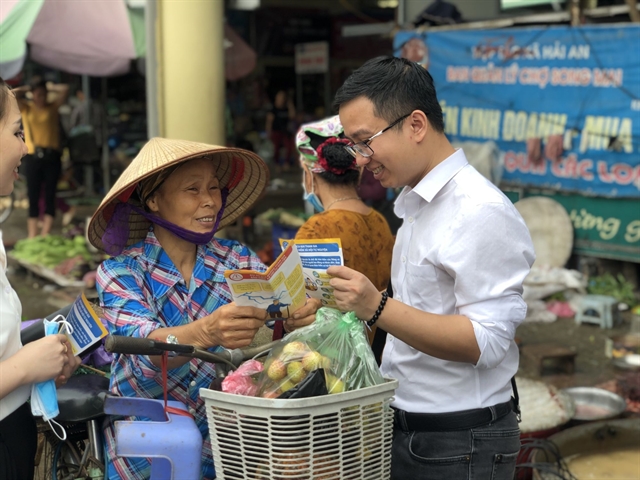 Society
Society

Many businesses have scaled down production and reduced their workforce due to the COVID-19 pandemic, leading to a decrease in the number of those participating in social and health insurance, as well as an increase in unpaid social insurance debts, experts have said.

|
| A social security officer introduces the voluntary insurance policy for a citizen. — VNA/VNS Photo |
HÀ NỘI — Many businesses have scaled down production and reduced their workforce due to the COVID-19 pandemic, leading to a decrease in the number of those participating in social and health insurance, as well as an increase in unpaid social security debts, experts have said.
As a result, the Government’s targets on sustainable development of participants in social insurance will be difficult to achieve if no drastic measures are taken.
Phạm Xuân Toan, director of southern Bình Thuận Province’s Social Security, said the COVID-19 pandemic had a great impact on many businesses in the province, proven by the adjustment of participants in social security and health insurance.
Figures from March 1 to the end of June showed that more than 740 enterprises in the province, accounting for 47.5 per cent of the total, have stopped participating in health insurance for more than 12,240 workers. These workers either quit their jobs or requested unpaid leave.
More than 7,000 employees have suspended social insurance contributions.
Toan said these businesses were mainly in the fields of tourism, restaurants and hotels, shoe production, and garment and textile.
The reduction of social insurance and health insurance participants had affected the sector’s targets, he said, adding that the unit had urged businesses to pay debts to ensure the interests of employees.
Bình Thuận is not the only province affected by the COVID-19 pandemic.
Reports from Vietnam Social Security showed that many enterprises across the country scaled down their production or temporarily suspended operations.
People's incomes decreased, so many people are not continuing their participation in voluntary social insurance or household health insurance. This led to a decrease in the number of participants in social and health insurance schemes.
The unpaid debts for social and health insurance have increased due to enterprises’ financial difficulties.
By the end of August, more than 15.3 million people participated in social security scheme, accounting for 31.2 per cent of the workforce; 12.8 million people participated in unemployment insurance, accounting for 26 per cent of the workforce; and 86.4 million people participated in health insurance, covering 89.2 per cent of the population.
Although the number of people participating in voluntary social insurance and health insurance increased compared to last year, the number of those participating in compulsory social insurance and unemployment insurance has decreased sharply.
The social insurance revenue has been lower than the same period last year, and the debts have reached VNĐ21.4 trillion (US$925 million), an increase of 0.4 per cent compared to the same period last year.
The Vietnam Social Security estimates that the sector need to attract more than 1.8 million people to join social insurance, 1.4 million people to join unemployment insurance, and 1.6 million people to join health insurance by the end of this year to achieve the Government’s targets.
Ensuring people’s benefits
Vietnam Social Security and local social security have made efforts to promote the reform of administrative procedures and the application of information technology in payments.
In the past eight months, the country has paid VNĐ151 trillion ($6.5 billion) in social insurance and VNĐ1.7 trillion ($73.5 million) in unemployment insurance for beneficiaries.
Compared to the same period in 2019, the number of people entitled to the sickness and maternity benefits has decreased, but the number of people eligible for monthly social insurance, lump-sum social insurance and unemployment insurance has increased.
Deputy General Director of the Vietnam Social Security Đào Việt Anh has asked the units to review and reassess the targets.
Addressing the challenges on the development of compulsory social insurance targets in this year, Deputy General Director of the Vietnam Social Security Trần Đình Liệu said it was possible to ensure the revenues this year.
Local social insurance agencies needed to implement measures to reduce debts of social insurance and health insurance for hard-hit businesses and strengthen inspections on businesses delaying debt payments. — VNS